
A few of the links in this post are affiliate links. If you buy something, we may earn a small commission (no extra bones from your wallet 🐾). Thanks for helping support the site and all of the dog adventures!
We know how a pet can become an inseparable part of your life. When we talk about dogs, especially, it’s clear they’re much more than pets; they’re family. This is why noticing something off about your furry companion can be distressing.
Diabetes is one of those silent worries that creep up on dogs, and understanding it is the first step toward managing it. We’re here to help you spot the signs early.
Your dog can’t tell you they’re feeling unwell, so it’s up to you to look out for ways your pet might be showing signs of diabetes. Some of the symptoms include excessive thirst, frequent urination, weight loss despite a normal or increased appetite, lethargy, or chronic infections. If your dog is showing these symptoms, don’t wait to take action.
Catching diabetes early is crucial because it can make management much simpler and improve your dog’s quality of life. That’s why we recommend consulting with your vet as soon as you notice something’s off. The vet will usually conduct a thorough check-up which includes blood work and urine tests to confirm a diabetes diagnosis.
Once diagnosed, your vet will be your guide, and together you’ll draw a roadmap to manage your dog’s condition. And a significant part of that plan will pivot on one thing: diet.
Diabetic dogs may have sensitivities that complicate their diet. Learn management tips in Common Dog Allergies and How to Manage Them.

Nutritional Management: The Foundation of Diabetic Care for Dogs
When your dog receives a diabetes diagnosis, adapting their diet is a critical step in managing the condition. A proper diet can help stabilize blood glucose levels and prevent complications. Unlike the diets of healthy dogs, diabetic dogs need a special balance of nutrients to maintain their health.
High-quality protein, complex carbohydrates, and fiber are key ingredients in a diabetic dog’s diet. Proteins help maintain muscle mass without causing rapid glucose spikes, while complex carbohydrates and fibers moderate blood sugar release and improve gut health.
Importantly, fats should be given careful consideration. While necessary in the diet, an excess of unhealthy fats can exacerbate diabetes. Instead, focus on good fats like omega-3 fatty acids, which can support anti-inflammatory processes.
Transitioning to a specialized diet should be a gradual process. Sudden changes can upset your dog’s digestive system and alter blood glucose levels in an unpredictable manner. It’s recommended to introduce the new diet slowly over several days.
Above all, working closely with your vet is paramount. They can provide you with a feeding plan that caters to your dog’s individual needs, based on their weight, age, and overall health. This collaboration ensures your dog receives the best possible care.
Changing diets safely is crucial for diabetic dogs. Step-by-step guidance is in How to Transition Your Dog to a New Diet.
Top 10 Recommended Foods for Diabetic Dogs
When you consider foods for diabetic dogs, keep in mind that the right diet can significantly impact their health and management of the condition. The priority is to stabilize blood glucose levels and prevent any complications. Here’s a closer look at foods that meet these stringent criteria.
Royal Canin Glycobalance
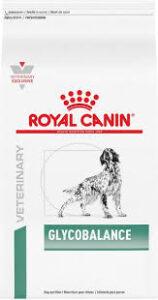
Royal Canin Glycobalance is the first on the list for a good reason. This formula is specifically crafted to aid in maintaining a healthy blood sugar level, thanks to its customized nutrient profile. It includes moderate levels of high-quality carbohydrates that provide a slow-release energy source — ideal for managing diabetes.
Hills Prescription Diet w/d

Next, there’s the Hills Prescription Diet w/d Glucose Management. This food has a special blend of nutrients aimed at metabolic support. Its high levels of fiber help control blood sugar peaks, which is crucial for your dog’s daily glycaemic control.
Blue Buffalo Natural Veterinary Diet
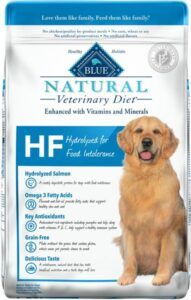
Blue Buffalo Natural Veterinary Diet makes an appearance here with a recipe that goes back to nature. The inclusion of wholesome ingredients supports an overall healthy lifestyle, while the controlled mineral levels and antioxidants make it suitable for diabetic dogs.
Wellness Core Digestive Health

Wellness Core Digestive Health puts the focus on your dog’s gut, which is a critical aspect of diabetes management. The prebiotics and probiotics support a balanced and beneficial intestinal environment, complementing the diabetic care regimen.
Ketona High Protein
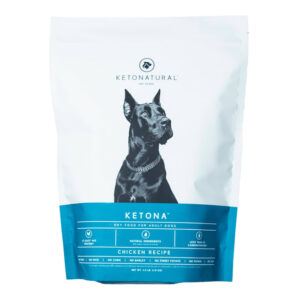
If you want to decrease your dog’s carbohydrate intake, Ketona High Protein provides an excellent solution. With its low carb content and high protein levels, this food aligns well with a ketogenic approach to diabetes management, something that’s gaining attention from experts.
Purina Pro Plan Veterinary Diets

For those looking for scientific backing, Purina Pro Plan Veterinary Diets fits the bill. Each of these foods is developed with veterinary research and is often prescribed alongside medical treatment for diabetes. This blend is specially formulated to help keep their weight down.
Farmina N & D Ancestral Grain
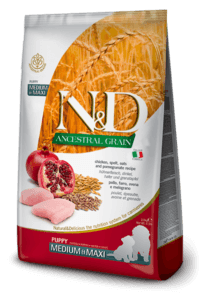
On the artisanal side, Farmina N+D Ancestral Grains offers a unique formulation with low-glycaemic index grains with spelt and oats. This aligns closely with a natural diet, and the specialized ingredients help in achieving better blood sugar control.
Orijen Amazing Grains
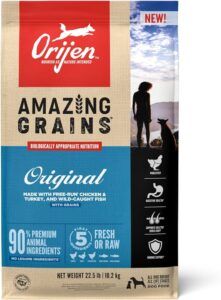
Orijen Amazing Grains celebrates what they call a biologically appropriate diet, with a diverse, whole-prey ingredient list that mirrors the evolutionary diet dogs thrived on before domestication. This formula has a high protein content to give your pup the right nutrition.
Just Food For Dogs Metabolic Support
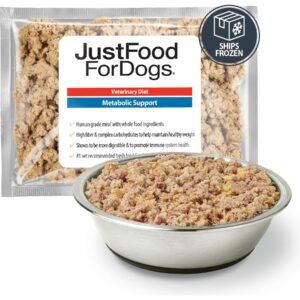
Just Food For Dogs appeals to those who prefer a more custom approach. They offer diabetic-friendly formulas that can be personalized to your dog’s specific health needs. The portions of animal proteins and oats were adjusted to maintain the right balance of high protein and carbohydrates to help keep your dog in peak form.
Hills Prescription Diet Metabolic
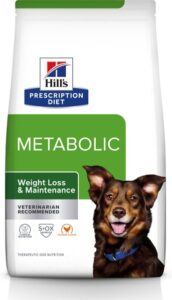
Finally, Hill’s Prescription Diet Metabolic provides a clinically proven blend that not only assists with blood sugar management but also supports weight management — a crucial aspect of diabetes care in dogs that tend to be overweight. This is why Hills Metabolic makes our list.
Feeding Your Diabetic Dog: Beyond the Bowl
Managing your dog’s diabetes isn’t just about choosing the right food; it’s a lifestyle commitment. Vet-approved nutritional choices are a cornerstone, but we’ve seen firsthand how pairing these decisions with other key practices promotes overall well-being.
Regular check-ups with your vet are crucial. They can help adjust food portions and medications as your dog’s condition evolves. Blood sugar monitoring, while it might seem daunting at first, becomes more manageable with practice and is vital to track your dog’s response to their diet.
Then there’s exercise. It should be consistent and tailored to your dog’s condition and energy levels. This not only helps in managing weight, which is crucial for diabetic dogs, but also keeps the metabolism working effectively. It’s important especially for a diabetic dog to get the right amount of exercise to keep its weight down and energy levels high.
Some owners have asked about homemade diets. While it’s an option, it requires careful balancing to meet nutritional needs. If you’re considering it, consult with a veterinary nutritionist to develop a recipe specific to your dog’s diabetic requirements.
Make sure that you are providing the right amount of protein and nutrients so your pup isn’t missing out on any vital ingredients for their health.
In conclusion, managing diabetes in dogs is a multifaceted task that extends beyond the food dish. By integrating vet-recommended diets — like the top 10 foods we’ve outlined — with regular monitoring, exercise, and potentially, personalized homemade meals, you can create a comprehensive care plan.
Healthy management of diabetes in dogs isn’t a one-size-fits-all endeavor, but with the right approach, your companion can lead a happy, active life.
Weight management is vital for diabetic dogs. See strategies in How to Keep Your Dog at a Healthy Weight.
Looking for fresh dog food delivered? Click here.

